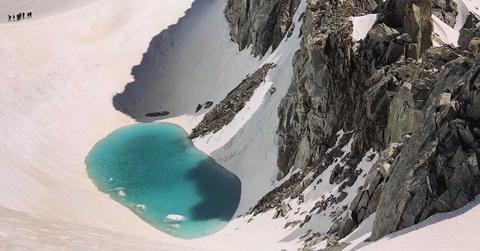Photo of French Alps Melting Into a Lake Is a Troubling Sign of the Climate Crisis
An alpinist captured a photo of the melting mountain.
Updated July 17 2019, 12:06 p.m. ET
A polar bear on a melting ice cap has long been a poster child for the climate crisis — but the melting French Alps just may be the latest hot embodiment. On a June 28 trek up the famous mountain, alpinist Bryan Mestre captured a concerning sight: A lake that had formed due to snow melting on the Alps, measuring about 30 meters long, he estimates. Mestre spotted the lake on the Mont Blanc mountain, which is the highest mountain in the Alps, at around 11,100 feet in altitude, The Independent reported.
Mestre shared a photo and video of what he witnessed on his Instagram, explaining that he spotted the lake at the end of a 10-day heatwave. "Only 10 days of extreme heat were enough to collapse, melt and form a lake at the base of the Dent du Géant and the Aiguilles Marbrées," Mestre wrote. "That I know, this is the first time anything like that as ever happened. Southern Europe and the Alps have been struck by a massive heatwave with temperature ranging from 40 to 50 degrees [Celsius]," which is 104 to 122 degrees Fahrenheit. (According to the New York Times, France did not exceed 114 degrees Fahrenheit in temperature.)
"This is truly alarming," Mestre continued in his Instagram post. "Glaciers all over the world are melting at an exponential speed."
Green Matters chatted with Mestre over Instagram direct message to learn more about what he witnessed on the Alps. As for what may have caused the lake to form, Mestre says: "I'm not a scientist but it's obvious that it's a direct effect of the heatwave that [struck] Europe in June. As you can see, the rock is black in this massif, so it probably acted as a solar oven melting everything that was close to it."
In the second slide of Mestre's Instagram post, he shared a photo taken 10 days later by Paul Todhunter. The photo, taken from almost the exact same angle, shows that the lake has already disappeared.
"To give you an idea [of] how crazy the climate is, two weeks ago we had the biggest heatwave in France's history," Mestre tells Green Matters. "Two days ago we had a snowstorm above 2,700 meters. So the good thing is, it froze over and it's sort of back to normal now, but we're expecting another heatwave next thing. So it'll probably just melt again, it's a permanent problem now."
Not only is the melting ice a concerning marker of the climate crisis, but it can also be risky for climbers. "And the danger with liquid water on glaciers... Well if it sneaks under and just accumulates there, it'll speed up the process, generate more liquid water and at one point it will have to empty itself somewhere," Mestre says.
According to NBC News, Paris reached 114 degrees Fahrenheit in temperature in late June, setting a new record for the country's hottest recorded day in history. Not only are these extreme temperatures an indication of the climate crisis deepening, but as explained by the Center for Climate and Energy Solutions, heatwaves can also: pose a threat to agriculture (the heat can kill crops as well as animals being raised for their meat, milk, and eggs), energy use (since heatwaves cause people to stay inside and use more air conditioning and lights), and public health (the high temperatures can kill people). Click here for tips on staying safe in heatwaves.
